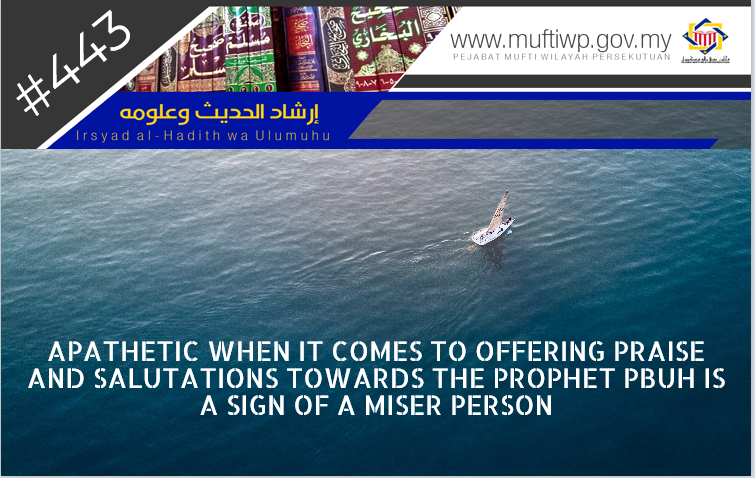Question:
What is the status of this hadith?
الْبَخِيلُ مَنْ ذُكِرْتُ عِنْدَهُ فَلَمْ يُصَلِّ عَلَيَّ
“A miser is a person of whom when my name is mentioned, then he did not recite praise and salutations for me.”
Answer:
Alhamdulillah, praise and thanks to Allah for the countless blessings He has blessed us all with. Blessings and salutations to the Prophet Muhammad PBUH, his wives, his family, companions and all those that follow his teachings to the day of judgement.
The Prophet PBUH is the most honored of people and reciting praise and salutations for him is encouraged in Islam as stated in Quranic and prophetic evidences.
- Allah SWT states:
إِنَّ اللَّـهَ وَمَلَائِكَتَهُ يُصَلُّونَ عَلَى النَّبِيِّ ۚ يَا أَيُّهَا الَّذِينَ آمَنُوا صَلُّوا عَلَيْهِ وَسَلِّمُوا تَسْلِيمًا
“Indeed, Allah confers blessing upon the Prophet, and His angels [ask Him to do so]. O you who have believed, ask [ Allah to confer] blessing upon him and ask [ Allah to grant him] peace.”
Surah al-Ahzab (56)
According to the above question, first we would like to present the source of the hadith before we discuss the opinions of scholars in evaluating the hadith:
This hadith is narrated by several companions of the Prophet PBUH such as Ali bin Abi Talib, al-Husain bin Ali and Abu Hurairah R.Anhum. Furthermore, this narration or hadith is included or narrated by Imam al-Thabarani in al-Mu’jam al-Kabir (2885). Moreover, Imam al-Tirmizi also narrated the same hadith in al-Jami’ or his sunan (3546). Imam Ahmad and Imam al-Tirmizi also narrated the hadith or narration with similar meaning but slightly different wording:
- From AbuHurairah RA, the Prophet PBUH said:
رَغِمَ أَنْفُ رَجُلٍ ذُكِرْتُ عِنْدَهُ فَلَمْ يُصَلِّ عَلَيَّ
“Shame on a person of whom when my name is mentioned and he did not supplicate for me.”
Musnad Ahmad (7451) and Sunan al-Tirmizi (3545)
As for the status of the above hadith or narration, here, we cite several opinions of scholars in evaluating this hadith:
- Imam al-Tirmizi (279 H) evaluate the hadith as hasan sahih gharib. [See Sunan al-Tirmizi, no. Hadith: 3546]
- Imam Ibn HIbban (354 H) state the hadith as sahih in his sahih. [See Sahih Ibn Hibban, 3/189]
- Imam al-Hakim (405 H) said the hadith is sahih but it is not narrated by al-Bukhari and Muslim. [See al-Mustadrak, 1/734]
- Imam Ibn Hajar al-Asqalani (852 H) evaluate the hadith as less than hasan. [See Fath al-Bari, 11/168]
- Imam al-Zurqani (1122 H) said the hadith is sahih. [See Mukhtasar al-Maqasid, 266]
- Imam al-Syaukani (1250 H) evaluate the hadith as masyhur. [See Nail al-Awthar, 8/278]
Reviewing the above opinions of scholars, we are inclined to state that the above hadith is sahih. As for the meaning of the hadith, as stated by Imam al-Munawi, those who refuse to recite praise and salutations to the Prophet PBUH when the Prophet PBUH’s name is mentioned is a miser towards himself for he has prevented from receiving ten praise and salutations of Allah SWT for him when he recites one praise and salutations towards the Prophet PBUH.
Imam Ibn Kathir after mentioning the hadith from Ali and Abu Hurairah said that these are the evidence that it is wajib to recite praise and salutations to the Prophet PBUH whenever his name is mentioned. This is the opinion of the madhhab from scholars such as al-Tahawi and al-Halimi. [See Tuhfah al-Ahwazi, 9/373]
Furthermore, it is attributed as a miserly act because a person is apathetic in performing obedience to Allah SWT (such as offering praise and salutations to the Prophet PBUH). [See al-Qaul al-Badi’, 321]
Closing
In conclusion, the hadith regarding a person is described as a miser when he refuses to recite praise and salutations to the Prophet PBUH when the Prophet PBUH’s name is mentioned is sahih as explained in the above discussion. Furthermore, there are numerous other sahih hadiths which state the advantages of those who always offer praise and salutations to the Prophet PBUH. Lastly, may Allah SWT make us from among His slaves who love the Prophet PBUH and are together with the Prophet PBUH in paradise in the hereafter. Amin.
Wallhua’lam.


